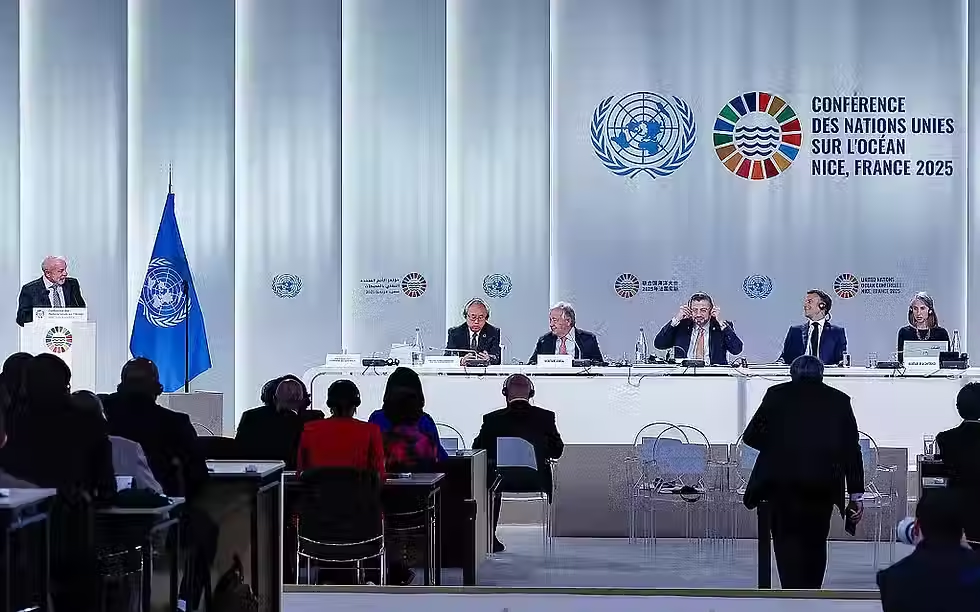Brazil and France launched Blue Nationally Determined Contributions Challenge
- TPP

- Jun 12, 2025
- 3 min read

At the third edition of the United Nations Ocean Conference (UNOC3), being held in Nice, France from June 9 to 13, 2025, Brazil and France have launched a groundbreaking initiative aimed at placing oceans at the centre of global climate action. Titled the ‘Blue NDC Challenge’, the initiative calls on countries to integrate ocean-focused climate measures into their Nationally Determined Contributions (NDCs)—the national climate action plans required under the Paris Agreement.
This initiative comes ahead of the 30th Conference of the Parties (COP30) to the United Nations Framework Convention on Climate Change (UNFCCC), scheduled for later this year in Belem, Brazil. Under the Paris Agreement, adopted by 195 Parties at COP21 in Paris on December 12, 2015, countries committed to limiting global temperature rise to well below 2°C above pre-industrial levels, with efforts to cap it at 1.5°C. The ‘Blue NDC Challenge’ is designed to strengthen this effort by addressing the critical but often overlooked role of ocean ecosystems in climate mitigation and adaptation.
So far, six countries—Australia, Fiji, Kenya, Mexico, Palau, and the Republic of Seychelles—have joined Brazil and France in committing to this initiative. These nations have pledged to incorporate ocean-based climate solutions in their updated NDCs, aligning with the deadline for the third round of NDC submissions for 2035, which passed on February 10, 2025. Despite the urgency, only 21 countries out of 195 Parties have submitted their NDCs this year.
Emphasizing Brazil’s leadership role, Marina Silva, the country’s Minister for the Environment and Climate Change, described the Blue NDC Challenge as a “key opportunity” to highlight the essential role of ocean-based solutions in achieving national and global emission reduction targets. She noted that the initiative also aims to boost international cooperation on ocean-climate action in the run-up to COP30.
Brazil's own commitment is already evident. Its NDC for 2035, submitted in November 2024, includes—for the first time—a dedicated focus on the Ocean and Coastal Zones. The updated Brazilian Climate Plan introduces measures such as Marine Spatial Planning and Integrated Coastal Zone Management, along with strategies to protect vital ecosystems like mangroves and coral reefs, as part of the nation’s broader Adaptation Plan.
These new commitments are not merely symbolic. Countries participating in the Blue NDC Challenge have agreed to tangible actions, such as sustainably managing and restoring marine ecosystems, developing climate-smart marine protected areas, and expanding clean ocean energy through sources like offshore wind, wave, and tidal power. Additionally, they aim to phase out offshore oil and gas, reduce emissions across shipping and seafood value chains, and promote climate-resilient fisheries and aquaculture to ensure long-term ocean health and food security.
According to Ashleigh McGovern, Senior Vice President for Oceans at Conservation International, Brazil is leading by example as the COP30 host nation. “We do not want to lose focus on oceans,” she said, stressing the importance of embedding ocean-based solutions into national climate plans. She highlighted the role of mangroves, which sequester carbon up to 10 times faster than terrestrial forests, and noted the significance of other ecosystems such as salt marshes in both mitigation and adaptation efforts.
McGovern also pointed out that including oceans in NDCs opens pathways for increased political and financial support. Organizations like the Global Mangrove Alliance, established in 2017, are working with countries to develop guides and best practices for ocean-inclusive climate policies. This alliance brings together non-profits, governments, scientists, industry leaders, local communities, and funders to conserve and restore vital mangrove ecosystems.
Support for countries joining the Blue NDC Challenge is also growing. They can access resources and assistance from global climate collaborations such as the Ocean Breakthroughs (led by the Marrakech Partnership for Global Climate Action), the UN High-Level Climate Champions, and the NDC Partnership, hosted by the World Resources Institute (WRI).
In a timely announcement on June 8, 2025, Bloomberg Philanthropies pledged $6.8 million to strengthen Brazil’s efforts to conserve its ocean and coastal ecosystems. “We cannot protect the climate without protecting the ocean,” affirmed Ana Toni, CEO of COP30, underlining the deep interconnection between ocean health and climate stability.
Adding further urgency to the initiative, Tom Pickerell, Global Director of the Ocean Program at WRI and Head of the Secretariat for the High-Level Panel for a Sustainable Ocean Economy, stated that ocean-based climate solutions could deliver up to 35% of the emissions reductions needed to meet the 1.5°C target. “But we are running out of time to maximise the ocean’s potential. That’s why countries must place the ocean at the heart of their climate strategies,” he warned.



Comments